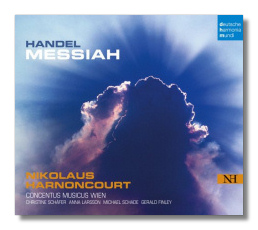
The Internet's Premier Classical Music Source
Related Links
- Handel Reviews
- Latest Reviews
- More Reviews
-
By Composer
-
Collections
DVD & Blu-ray
Books
Concert Reviews
Articles/Interviews
Software
Audio
Search Amazon
Recommended Links
Site News
 SACD Review
SACD Review
George Frideric Handel

Messiah
- Christine Schäfer, soprano
- Anna Larsson, alto
- Michael Schade, tenor
- Gerald Finley, bass
Arnold Schoenberg Choir
Concentus Musicus Wien/Nikolaus Harnoncourt
Deutsche Harmonia Mundi 82876-72039-2 DDD 2 Hybrid Multichannel SACDs 69:27, 71:30
In some ways, this is the least English Messiah I've heard outside of Mozart's arrangement. Only one of the four soloists (Finley) is a native English-speaker, and the Vienna-based choir must be comprised mostly if not exclusively of German-speaking singers. It would be ridiculous to suggest that Germans and Austrians should not perform Messiah in English. (Imagine suggesting that Americans shouldn't perform Fidelio or Ein Deutsches Requiem!) My point is simply that many listeners will be caught off-guard by the occasional non-idiomatic pronunciations (for example, the alto's "Then shall the ice of the blind be opened"!).
Harnoncourt has produced a rather paradoxical reading of the score. The choruses are intimate, even hushed, and in contrast, the solos are given a nearly operatic intensity. It feels as if the conductor is trying to tie Messiah to Handel's earlier Italian operas in London, rather than presenting it as a fresh departure from the same. (The truth probably lies between the two.) Schade and Larsson are particularly dramatic. Schade snarls with contempt for the crowd as he describes the mocking of Christ and again in "Thou shalt break them," and Larsson waxes lachrymose in "He was despised." In "Why do the nations," Finley sounds duly exercised about the nations raging together and the people imagining a vain thing. None of this is wrong; it's just stronger stuff than we usually get. On the other hand, the "Hallelujah!" chorus almost sneaks up on us. Rather than presenting it as the work's climax, Harnoncourt makes it a super-smooth and seamless part of the whole. There are no shrieking sopranos and screaming trumpets here!
In an introductory note, Harnoncourt explains some of the decisions he made in preparing this Messiah. These include string ensembles of different sizes at different points in the work, and a relatively free approach to rhythm, as suggested by the conductor's perusal of the autograph score. (Listen to the bass's "Thus saith the Lord" for an example of Harnoncourt's flexibility.) The conductors eschews boys, gives "But who may abide" and "Thou art gone up high" to the alto, and makes "He shall feed his flock" a duet for the soprano and alto. The "Pifa" is played in its first version, but Harnoncourt chooses later versions of both "How beautiful are the feet" and "Their sound is gone out." The well-drilled, soulful chorus and the orchestra are small but not stingy-sounding.
Schäfer sounds a bit more reticent here than she has on other recordings. At any rate, her singing has a touching, appealing fragility here. Larsson, on the hand, is an imposing alto – it's almost as if The Mikado's Katisha had wandered in from a Gilbert and Sullivan society! Among the four soloists, she is the most memorable. Michael Schade is melting in his opening accompagnato and aria, and convincingly militant in "Thou shalt break them." Finley lacks the dark sound I look for in "Thus saith the Lord" and "The trumpet shall sound," but to be fair, he's probably pretty close to what Handel had available to him in the 1740s.
This is a live performance – really, a composite of several - from December 2004. You won't notice the audience though, except at the beginning and between some of the numbers. This is helpful, because what's Messiah without a feeling of occasion? Live recording can create that feeling, and at least to some degree, that is what happens here. The engineering is first-class. (N.B., although this is a Super Audio CD, I heard it on a conventional CD player.)
Although this probably would not be a safe first choice for the reasons given above, this is a very worthy Messiah, and it sounds better and better the more one hears it.
Copyright © 2006, Raymond Tuttle




















